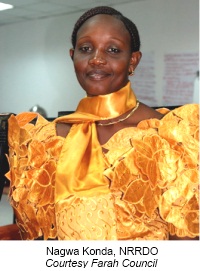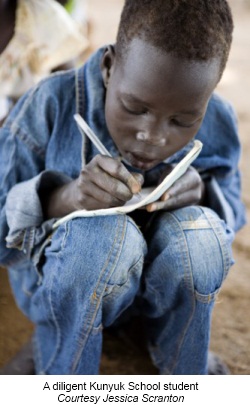| Summer 2011 |

|

|

|
 A Women-Led Humanitarian and Human Rights Initiative Summer 2011Happy Independence Day, Republic of South Sudan! We hope you and your family are making wonderful summer memories! This update is brought to you courtesy of our Sisterhood for Peace initiative! This project supports a growing network of diverse women who are collaborating across the traditional barriers of race, religion, ethnicity and geography that have pitted Sudanese against one another for generations. The Sisterhood launched in 2007 with 8 courageous Diaspora women. Because of your generosity , the network has grown to over 400 dynamic peacemakers in northern Sudan, South Sudan and the Diaspora. July 9th marked the inaugural Independence Day for the newly birthed Republic of South Sudan. Six months ago, sisters from all regions expressed support of the referendum and the Southerners‟ right to self-determination. However, the 99% vote in favor of separation evoked different sentiments among women from different regions. We invite you to compare the reflections of Sarah from South Sudan, Niemat from Darfur and Nada from northern Sudan.Follow Sarah and Her Boys in Sudan This Summer on Facebook!
We’re especially excited that Sarah—who is also a devoted mother—will be traveling with her three wonderful sons, Boulo (11), Cleto (7) and Christopher (5). The boys could not be more supportive and prouder of Mom! All their lives, they’ve heard their single-parent mother speak of her beloved Sudan. Finally, they will experience the Motherland for themselves. In fact, they’ll be in South Sudan on July 9th when the new country officially becomes Africa’s newest independent nation. The boys, all of whom are students at the Brookwood School in Manchester, MA, are excited about meeting new relatives and witnessing this unique historical moment. Boulo, who is in the 5th grade, enjoys basketball, soccer and writing. He’ll be contributing to our Facebook page while the family is in Sudan. They’ll begin the 8000-mile trip on June 22nd and you’re invited to come along! Simply become a fan on our facebook page at My Sister’s Keeper, the Nonprofit Organization. Follow Boulo and the family while they’re on the road! Peace Throughout Sudan—Still Elusive
However, peace throughout Sudan remains elusive as conflicts abound within and between North Sudan and South Sudan. The crisis in Darfur persists, as northern armies regularly launch military offensives against civilians, and then impede humanitarian access to the victims. Three million Darfurians are still displaced in Darfur, Chad and throughout Sudan. Tensions in Southern Kordofan State, which includes the Nuba Mountains, have fueled post-referendum violence. (see next article). Clashes persist between northern and southern armies in the disputed border region of Abyei. The escalating conflicts inside South Sudan are ominous. The United Nations estimates that more than 1000 people in South Sudan have perished and 94,000 have been displaced since January 2010 referendum. Sporadic attacks in South Sudan by elements of neighboring Uganda’s Lord's Resistance Army are regular occurrences. Fighting between South Sudanese insurgent militia groups and the South Sudanese army are extremely worrisome, as are the second-tier skirmishes between rival ethnic groups over such resources as land, water and cattle. To keep abreast of the troubling events throughout Sudan, see http://www.enoughproject.org/, http://www.savedarfur.org/, or http://www.sudanactionnow.org/. With so many ongoing crises inside Sudan, our Sisterhood for Peace network of women peacebuilders needs your partnership more than ever. Committed to averting more disaster, they’ve asked us to increase our support of their tireless efforts to chip away at the barriers of race, religion, ethnicity and geography that have pitted Sudanese against Sudanese for generations. As Sarah states, “Our country is divided geographically, but we remain united as women. We must learn to live side by side in peace.” Sarah’s comments are echoed by Sudanese women in Sudan and throughout the Diaspora who are desperate for peace. We can increase our support if you will increase your giving . Sisterhood for Peace in Troubled Southern Kordofan State
El-Feid is only 50 miles away from the venue in Kauda where My Sister’s Keeper facilitated our most recent training in December 2010. At the request of our SKS-based partners, Nagwa Konda of Nuba Relief, Rehabilitation and Development Organization (NRRDO) in Kauda and Zeinab Balandia of Ru’ya Association in Kadugli, we conducted our signature conference, “Building Pathways to Sustainable Peace in Southern Kordofan”. Thirty-three diverse grassroots women leaders convened from 12 localities throughout the state for training in cross-cultural communication, consensus building and action planning. Our staff was joined by 3 phenomenal women peacebuilders living in the US who have been working in our Diaspora-based Sisterhood for Peace network: Hind Elshazali, North Sudan and Brooklyn, NY; Rita Lako, South Sudan and Manchester, NH; and Bakhita Saabino, South Sudan and Portland, ME.
Women’s empowerment is not only about knowing—it’s also about doing! Each participant then developed an individual action plan to recruit women registrants and reported to the entire group on her personal goal and how she intended to accomplish it. The total of their individual commitments came to a whopping 20,725 women recruited to register as voters in the upcoming election!
So, how did the Sisters for Peace do? We received this report from our partner, Nagwa:
We don’t have precise numbers of women registered through our Sisters. However, according to UN reports, while the overall turnout was low (600,000 registrants) the percentage of women registrants was a record 65-70%. The Carter Center, an international observer of the process, noted, “Women were observed actively participating in the voter registration process. This is an important achievement, especially given Sudan’s challenges in ensuring gender equality.” Congratulations are in order not only to Sisters for Peace, but also to several other partners who also have focused on ensuring women’s inclusion. Because of our commitment to be led by those most affected by the conflicts, our Sisterhood peacebuilding initiative is entirely participant driven. Action plans generated by our Sisters require critical follow-up. It has been difficult to follow up well without a steady presence on the ground. That’s why they’ve urged us to establish an office in Juba as a home base from which we can provide more effective support. We’re seeking $35,000 of renewable funding for our in-country manager. Your partnership will be essential to making this happen . Building Educational Pathways to Sustainable Peace
In November 2010, the United Nations Mission in South Sudan published a compilation of “Scary Statistics—Southern Sudan” that delineates some of the extremely worrisome challenges for the new nation:
Many experts have observed that educating women and girls is the fastest shortcut to reversing generational marginalization and improving the economic growth and viability of the entire community. That’s why MSKeeper is so committed to the 600 primary students and 14 teachers at the Kunyuk School for Girls and the 200 students and 6 teachers and staff at the Women’s Peace School for adult literacy. Having completed construction of the permanent campus in the village of Akon, we’re now focused on supporting training opportunities for our dedicated teaching staffs. In March 2011, we provided support for Kunyuk Headmaster, Dominic Deng, and teacher, Tereza Chol, to participate in a 12-day training in Juba organized by literacy specialists, Janet Fincke, Judy Backlund and Phil Backlund, from Central Washington University in Ellensburg, WA. The conference was presented as a training of trainers, which our teachers found invaluable. Dominic observed, “This is my first time ever to attend such a program where we learned how to teach and how to support students to understand.” Dominic and Tereza got right to work planning a training for their fellow Kunyuk teachers. In early May, they trained 5 of their colleagues with the new approaches they learned from the Ellensburg team. How cool is that! In July 2011, MSKeeper will return to Akon to meet with the teachers, students, parents and other key community stakeholders, as well as the Warrap State Minister of Education. Our group will conduct a baseline assessment of literacy and numeracy skills in cohorts of Kunyuk students and Women’s Peace School students. We’ll use this baseline to track the impact of a formal teacher training intervention which we anticipate hosting in Akon in February 2012. In addition to funding a full-time Juba-based staff person, we’re seeking $15,000 in renewable support to hire a part-time Akon-based coordinator to facilitate our educational work. Your contributions will help support this effort. You Can Help My Sister’s Keeper Create a “Better and Safer World” for All of Us! I’m writing this update a week after Pres. Obama announced the death of Osama bin Laden, world-renowned progenitor of terrorism. Sudan knows bin Laden well. He grew the al Qaeda network while living in Khartoum from 1991-1996. From there he orchestrated several major attacks that targeted American troops in Yemen, Somalia and Saudi Arabia, before masterminding the devastating attack on September 11, 2001 in which 3000 people died. In January 2010, Secretary Hillary Clinton wisely observed, “If you look around the world at the areas that are unstable and are incubators of terrorism or other forms of violence, you will find women and girls being oppressed, being denied rights, being marginalized in a way that is dehumanizing... it is something that I see as Secretary of State that is absolutely integral to our approach to the kind of better and safer world that we are all trying to create." My Sister’s Keeper understands well that our mission is not simply about transforming the lives of women and girls in a faraway land. It’s also about working with our partners to create a “better and safer world” for all of us. We hope you’ll catch our vision, give generously and come alongside us to incubate dreams and hope, rather than death and destruction. We need your support now more than ever.
For more information, please contact us at 215 Forest Hills Street, Boston, MA 02130-3302; |


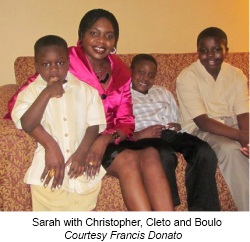 June 2011 will find Sarah returning to South Sudan to spend the entire summer. Because of
June 2011 will find Sarah returning to South Sudan to spend the entire summer. Because of 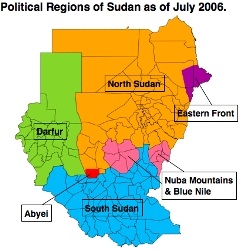 January 9, 2011 marked a signature moment in Sudan’s tortuous history as Southerners took to the polls to cast their ballots on the question of separation from northern Sudan. After decades of enduring what they consider an oppressive Khartoum-based government, 99% of voters called for the birth of Africa’s newest nation. After multiple generations have known only war, Southerners are eager to experience the peace of which their mothers and fathers dreamed and for which they died.
January 9, 2011 marked a signature moment in Sudan’s tortuous history as Southerners took to the polls to cast their ballots on the question of separation from northern Sudan. After decades of enduring what they consider an oppressive Khartoum-based government, 99% of voters called for the birth of Africa’s newest nation. After multiple generations have known only war, Southerners are eager to experience the peace of which their mothers and fathers dreamed and for which they died.
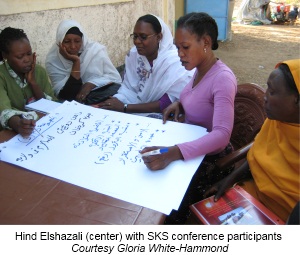 Southern Kordofan State (SKS) remains one of Sudan’s most volatile regions. The oil-rich state that includes Nuba Mountains is on the border between the North and the South and is marked by ethnic hostilities between indigenous African tribes and Arab tribes. Tensions have escalated leading up to the May 2011 state elections. In April, the Satellite Sentinel Project cofounded by actor-activist, George Clooney,
Southern Kordofan State (SKS) remains one of Sudan’s most volatile regions. The oil-rich state that includes Nuba Mountains is on the border between the North and the South and is marked by ethnic hostilities between indigenous African tribes and Arab tribes. Tensions have escalated leading up to the May 2011 state elections. In April, the Satellite Sentinel Project cofounded by actor-activist, George Clooney, 